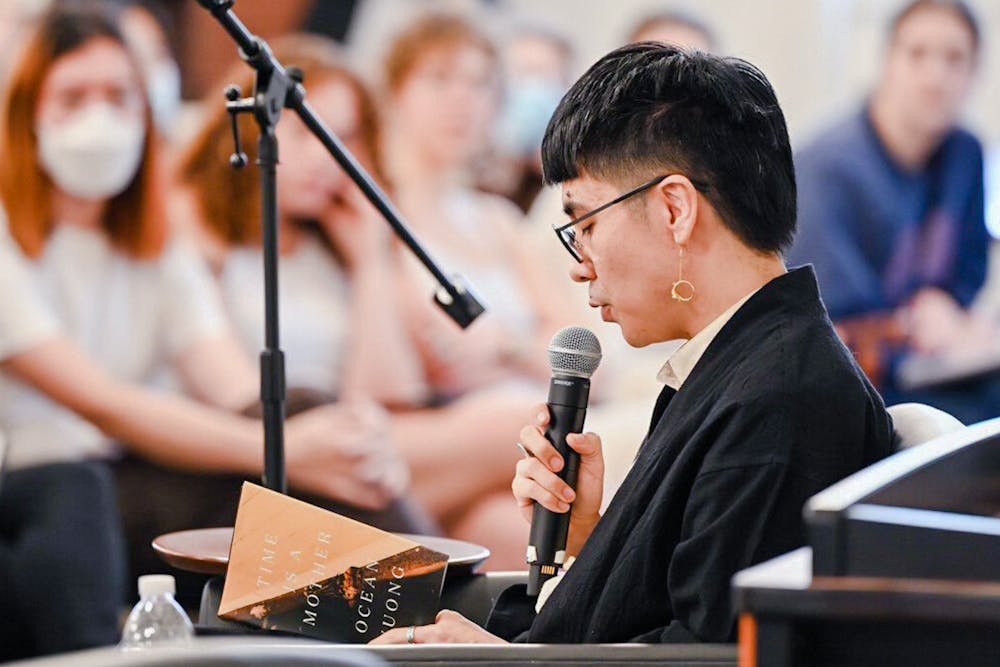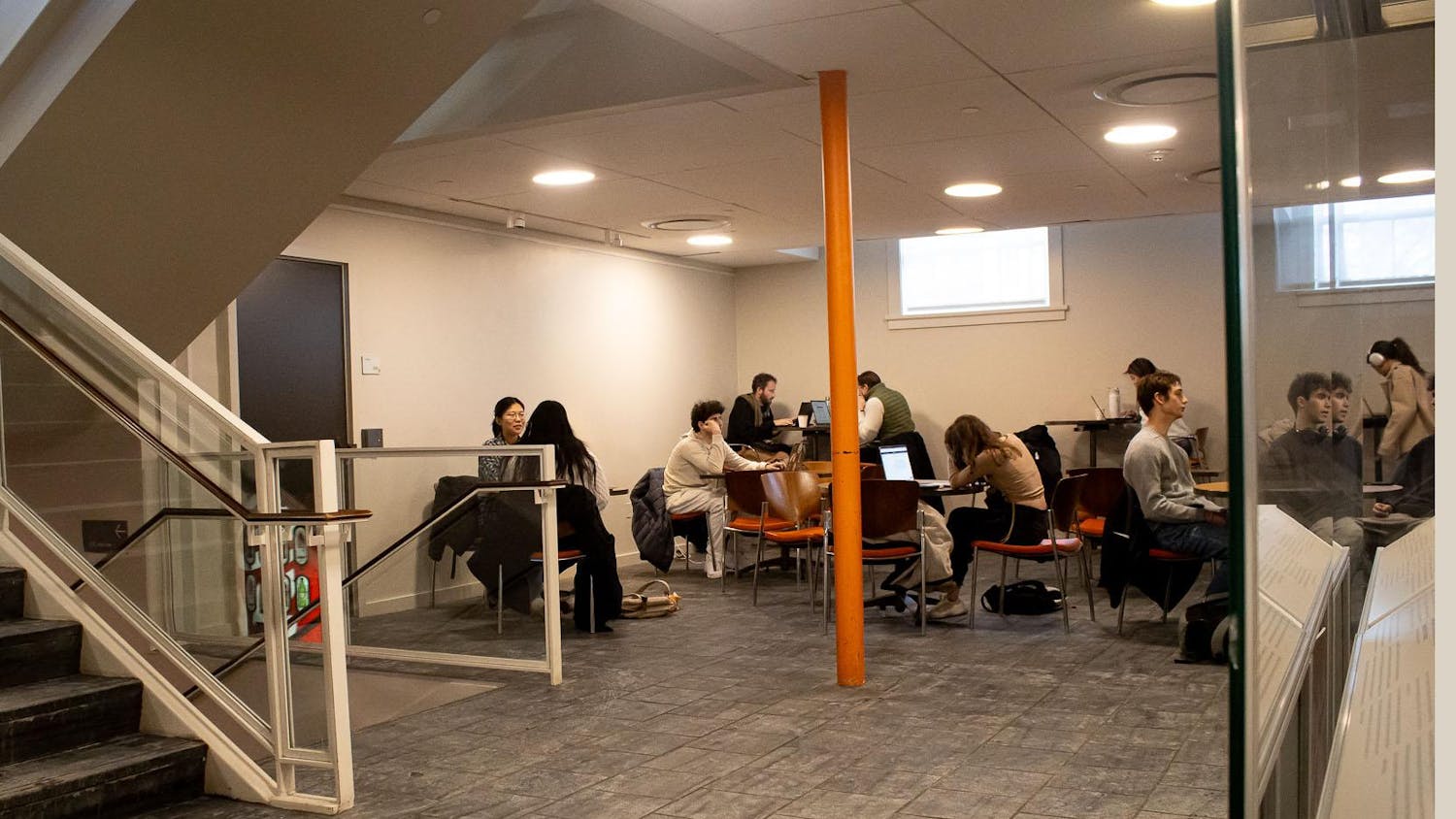Ocean Vuong, celebrated poet and author of “On Earth We’re Briefly Gorgeous,” spoke about his experiences as a queer, Vietnamese American poet as part of the Greg and Julie Flynn Cogut Institute Speaker Series Thursday.
The public event was moderated by Daniel Kim, professor of American studies and a specialist in Asian American literature. Vuong also spoke with a smaller group of undergraduates in a seminar-style meeting titled “A Conversation with Ocean Vuong.”
The Greg and Julie Flynn Cogut Institute Speaker Series seeks to showcase “speakers who have had multivalent careers or projects that they’re working on,” Gregory Kimbrell, communications manager for the Cogut Institute for the Humanities, said in an interview with The Herald.
“The most obvious (aspect of Vuong’s work) is the power (with) which he conveys the refugee experience,” Kim said in an interview with The Herald. He added that Vuong’s “take on queer experiences … is really fresh (in) how he accepts that pain and tragedy is part of these Vietnamese and queer experiences but also tries to wrest what is beautiful out of it.”
The public conversation began with Kim sharing his first encounters with Vuong’s work and the experience of teaching his poetry to students. “When we get together to talk about his work, we lose all critical distance because we’re blown away by his writing,” Kim said.
Amy Pham ’23 attended the event after having taken a course taught by Kim, in which she learned about Vuong’s work. “I’m also Vietnamese American, and I felt like for me, he embodied a lot of what I felt the Vietnamese experience in America is,” she said.
During the event, Vuong recited his poems “Toy Boat" and “American Legend,” both of which come from his collection “Time is a Mother.” According to Vuong, the latter poem is an effort to subvert “the false promise of manifest destiny.”
“What happens if you purposefully crash the car, the vehicle of ultimate progress?” Vuong asked the audience.
Vuong addressed how well-known Asian American individuals are often misconstrued as representatives of their whole community. Kim recalled a moment when novelist Viet Nguyen spoke at Brown in April 2018, and “an older white couple who were anti-Vietnam war protesters apologized to him for the war.”
“One of the fraudulent myths of representation that I am very skeptical of is that the project of representation is to imbue one person as the symbol for all,” Vuong said. This “dehumanizes the person and also abstracts the group.”
“We are obligated to reject that apology,” he added.
“You are no longer apologizing to a human being. You are apologizing to a hologram that reflects your own insecurities, and I cannot be your mirror.”
Kim then steered the conversation towards a discussion about Vuong’s practice of Buddhism. “Buddhism is central to me in how I live and think,” Vuong said, adding that Buddhism allows him to apply an “anticolonial praxis” to his poetry.
“Writing a poem about any one thing does not mean I have possessed it,” Vuong said.
Kim also drew a comparison between Vuong and singer-songwriter Phoebe Bridgers, specifically Bridgers’ song “Killer” and Vuong’s poem “Self-Portrait of Jeffrey Dahmer,” both of which reference the serial killer who targeted queer communities of color.
“I love Phoebe’s work,” Vuong said. “The idea that one could have a tool and instrument as the voice and that the whisper could be just as meaningful, I am deeply interested in that. Particularly in an Asian American ethos and a queer American ethos as well.”
Vuong explained that “Self-Portrait of Jeffrey Dahmer” was part of an investigation of the idea of empathy. “When I started to become a writer, I started to hear the word ‘empathy’ as a final destination,” he said.
But “it’s mostly utopic for whiteness, … because whiteness could then perform that liberal labor of learning about others,” Vuong added. “So it has everything to gain from empathy.”
“When you flip that to Dahmer, to various structures of harm, how could this be?” he said. Vuong explained that the poem was an experiment in which empathy fails. “It was the scariest poem I had ever written, and probably the most important for me, because I got the poem to something only poems could do, which is a way to enact a limitation — a limitation I knew was there but could not locate.”
Kim then opened up the conversation to student questions, which focused first on the line between fiction and memoir in Vuong’s works.
Vuong said that his novel “On Earth We’re Briefly Gorgeous” included “only six percent” of his life, but many readers still interpret the book as a memoir. “How do I truly write a novel that the culture will distort anyways?” he asked the audience.
“Agency above all,” Vuong said. “When I am reading a book, I am reading a personhood. I am reading someone narrating their nervous system.”
Vuong concluded by addressing a student’s question on the weight of the Asian American label.
“The abstracted label … cannot hold anybody,” he said. “I am free to go beyond. … Every word you write down is already there. Go beyond the tokenizing label.”
Ashley Guo is an arts & culture writer and layout designer. She previously covered city and state politics as a Metro section editor. In her free time, Ashley enjoys listening to music, swimming, and reading!





